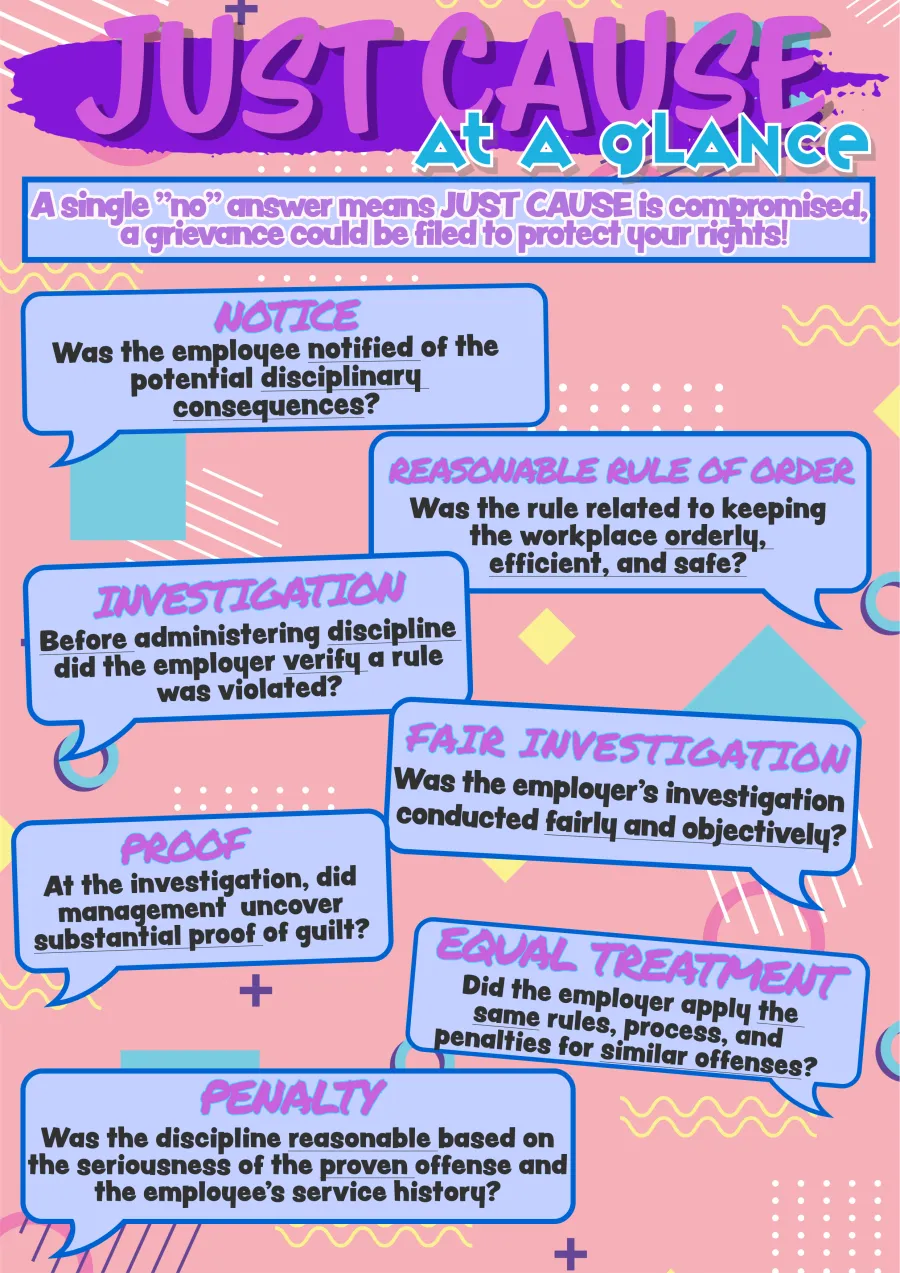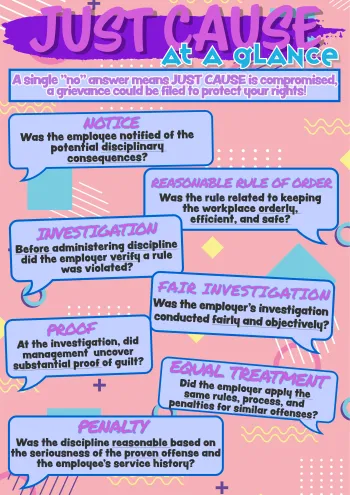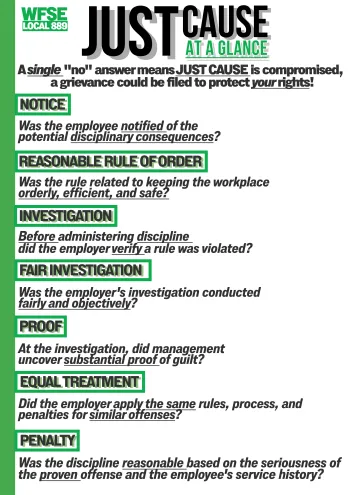Just Cause - or Just Cuz?

Management may make some decisions based on vibes, but there's only so far they can go before violating our rights. In order to discipline an employee who has permanent status, DCYF must have just cause (Article 27.1 of our Collective Bargaining Agreement). This can be broken down into seven components, described below, which must ALL be met. A single no means just cause is compromised - if management tries to discipline you, a grievance could be filed to protect your rights.
This is why it's important to talk to a steward or council representative whenever discipline is a possibility. You have the right to union representation whenever you think a meeting or discussion has the potential to lead to discipline, or that it could in some way adversely affect your conditions of employment (your Weingarten Rights, also Article 27.5(A) and 36.5 of the CBA). The list below is sometimes organized or described differently, but the overall principles are the same.
Principles of Just Cause
- Notice: Management can't discipline you for violating a rule they never publicized. They also need to identify potential penalties for violating rules. That doesn't mean they won't try to do this, or even that they won't just make something up to try to get you to admit to breaking another rule.
- Reasonable Rule of Order: Management can't just make up and strongly enforce absolutely any rules they want. Was the rule they're trying to discipline you over related to keeping the workplace orderly, efficient, or safe? Or are there any mitigating, extenuating, and aggravating circumstances? Did they ban employees from wearing the color green (hmmm), and you accidentally wore a green hair tie?
- Investigation: You have the right to due process. Did the Employer actually verify a rule was violated before administering discipline? Did they take action promptly? Did they clearly state their allegations? They have to give you a chance to tell your side of the story, they have to conduct a real investigation, and they have to follow specific procedures for doing so. The overall process is described in Article 27 of our Collective Bargaining Agreement, and a steward or union rep can help you through it.
- Fair Investigation: Was the investigation itself conducted fairly and objectively? Or did they talk only to your nemesis at work and ignore the eight other witnesses who came forward? Did they wipe your computer, with all your supporting evidence, by "accident," before you had the chance to present it? We suggest keeping paper printouts of anything important, in addition to copies and backups on your computer or phone. You do still need to maintain client confidentiality, however.
- Proof: Did Management find substantial and credible evidence of guilt during the investigation? Or are they relying only on triple-hearsay and a palm reading? Did your supervisor accuse you of turning them into a newt? You can't be disciplined without real proof. And they can't keep their "proof" hidden from you - they must share it before imposing discipline. Are they asking you to sign a false statement related to the investigation? Correct it, in writing, and don't sign it until it's accurate.
- Equal Treatment: Without a valid reason, the Employer can't punish one employee more harshly than another for the same offense. They can't show favoritism or discriminate without reason with discipline, rules, or the disciplinary process. This also means that they can't target you for being active in our union. As of the writing of this article, we've received several reports of members being targeted for discipline because of their union involvement. If you think it might be happening to you, talk to your steward or union representative - if you aren't doing so already.
- Penalty: Was the discipline reasonable based on the seriousness of the proven offense and your service history? If the offense isn't egregious, Management must - at least initially - discipline you in a way that allows you to improve. Discipline should be the minimum necessary to correct the identified misconduct, and should not be intended to punish or humiliate. They have to protect your privacy during the investigation as well.
Protecting Your Rights
If you think management may be violating your rights, you are being investigated or disciplined, or if you are facing any kind of issue at work, your best resource is your union steward, council rep, or the Member Connection Center (MCC). Even if the discipline seems minor, choosing not to enforce the contract can have larger impacts down the road: on you, on our clients, and on all of us collectively. It's ridiculous that Management often doesn't understand the simple concept that discipline should be used fairly and appropriately - and that it can't fix severe understaffing - but our union gives us the power to fight back, and to teach them to respect our rights.
Additional Resources
Find more resources and information about just cause on WFSE's Steward Education and Resources page.
View and share two flyers created by WFSE Local 889 below. You are welcome to use them yourself, share them with others, or stewards can add them to your union boards. Just remember not to print or share them using state resources or on work time.


